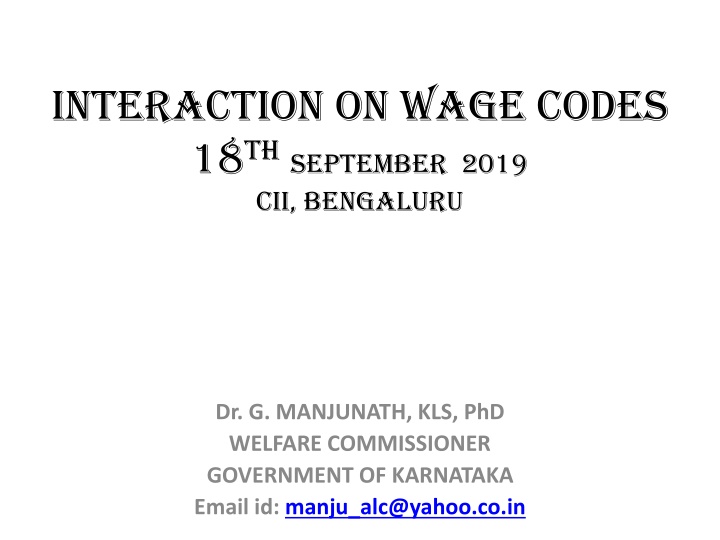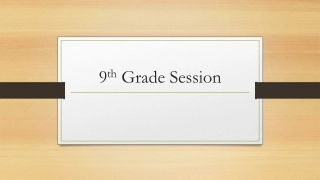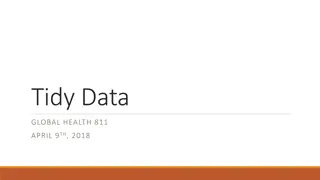9th Grade Guide to Success at Bloomingdale High School
This comprehensive guide provides valuable information on graduation requirements, academic resources, and key contacts at Bloomingdale High School. From counseling department details to the necessary credits and scores for graduation, this guide covers essential topics to help 9th graders navigate through their high school journey successfully. Additionally, it highlights the roles of school staff members, such as the principal, academic coach, and counselors, in supporting students' academic and personal development.
Download Presentation

Please find below an Image/Link to download the presentation.
The content on the website is provided AS IS for your information and personal use only. It may not be sold, licensed, or shared on other websites without obtaining consent from the author.If you encounter any issues during the download, it is possible that the publisher has removed the file from their server.
You are allowed to download the files provided on this website for personal or commercial use, subject to the condition that they are used lawfully. All files are the property of their respective owners.
The content on the website is provided AS IS for your information and personal use only. It may not be sold, licensed, or shared on other websites without obtaining consent from the author.
E N D
Presentation Transcript
Interaction on wage codes 18thSeptember 2019 CII, Bengaluru Dr. G. MANJUNATH, KLS, PhD WELFARE COMMISSIONER GOVERNMENT OF KARNATAKA Email id: manju_alc@yahoo.co.in
IMPACT ON EMPLOYERS AND THE EVOLVING COMPLIANCE STRUCTURE UNDER UNDER THE CODE ON WAGES, 2019 THE CODE ON WAGES, 2019 THE CODE ON WAGES, 2019- - IMPACT ANALYSIS IMPACT ANALYSIS 4/4/2025 2
The Code on Wages, 2019 Arrangement of Clauses CHAPTER I PRELIMINARY CLAUSES 1 Short title, extent and commencement 2 Definitions 3 Prohibition of discrimination on ground of gender 4 Decision as to disputes with regard to same or similar nature of work CHAPTER II MINIMUM WAGES 5 Payment of minimum rate of wages 6 Fixation of minimum wages 7 Components of minimum wages 8 Procedure for fixing and revising minimum wages 9 Power of Central Government to fix floor wage 4/4/2025 3
Arrangement of Clauses 10 Wages of employee who works for less than normal working day 11 Wages for two or more classes of work 12 Minimum time rate wages for piece work 13 Fixing hours of work for normal working day 14 Wages for overtime work CHAPTER III PAYMENT OF WAGES 15 Mode of payment of Wages 16 Fixation of wage period 17 Time limit for payment of wages 18 Deductions which may be made from wages 19 Fines 20 Deductions for absence from duty 21 Deduction for damage or loss 4/4/2025 4
Arrangement of Clauses 22 Deductions for services rendered 23 Deductions for recovery of advances 24 Deductions for recovery of loans 25 Chapter not to apply to Government establishments CHAPTER IV PAYMENT OF BONUS 26 Eligibility for bonus, etc 27 Proportionate reduction in bonus in certain cases 28 Computation of number of working days 29 Disqualification for bonus 30 Establishments to include departments, undertaking, and braches 31 Payment of bonus out of allocable surplus 32 Computation of gross profits 4/4/2025 5
Arrangement of Clauses 33 Computation of available surplus 34 Sums deductible from gross profits 35 Calculation of direct tax payable by the employer 36 Set on and set off of allocable surplus 37 Adjustment of customary or interim bonus against bonus payable under this Code 38 Deduction of certain amounts from bonus payable 39 Time limit for payment of bonus 40 Application of this Chapter to establishments in public sector in certain cases 41 Non-applicability of this Chapter 4/4/2025 6
Arrangement of Clauses CHAPTER V ADVISORY BOARD 42 Central Advisory Board and State Advisory Board CHAPTER VI Payment of Dues, Claims and Audit 43 Responsibility for payment of various dues 44 Payment of various undisbursed dues in case of death of employee 45 Claims under Code and procedure thereof 46 Reference of disputes under this Code 47 Presumption about accuracy of balance sheet and profit and loss account of corporations and companies 48 Audit of accounts of employers, not being corporations or companies. 49 Appeal 50 Records, returns and notices. 4/4/2025 7
Arrangement of Clauses CHAPTER VII INSPECTOR-CUM-FACILITATOR 51 Appointment of I-CUM-F CHAPTER VIII OFFENCES AND PENALTIES 52 Cognizance of offences 53 Power of officeers of appropriate Government to impose penalty in certain cases 54 Penalties for offences 55 Offences by companies 56 Composition of offences 4/4/2025 8
Arrangement of Clauses CHAPTER IX MISCELLANEOUS 57 Bar of suits 58 Protection of action taken in good faith 59 Burden of proof 60 Contracting out 61 Effect of laws, agreements, etc, inconsistent with this Code 62 Delegation of powers 63 Exemption of employer from liability in certain cases 64 Protection against attachment of assets of employer with Government 65 Power of central Government to give directions 66 Saving 67 Power of appropriate Government to make rules 68 Power to remove difficulties 69 Repeal and savings 4/4/2025 9
Code on Wages vs. Repealed Enactments ACT DEFINITIONS SECTIONS SCHEDULES RULES FORMS/NOTIFIC ATIONS MW ACT (1948) 11 31 1 37 PW ACT (1936) 10 26 - 40 PB ACT (1965) 22 40 4 5 ER ACT (1976) 10 18 - 6 TOTAL 53 115 5 88 COW (2019) 26 69 - To be framed To be framed 4/4/2025 10
Who is an Employer? Cl. 2(l). Employer means a person who employs one or more employees in his establishment either directly or through any person In case of CG/SG, the Head of the dept or the authority so specified; In case of local authority, the chief executive; In case of a factory, the occupier and the manager; In case of any other establishments, the person who has ultimate control over the affairs of the establishment and manager, or MD, if such affairs is entrusted to them Contractor Legal representative of a deceased employer 4/4/2025 11
Who is a contract labour contract labour means a worker who shall be deemed to be employed in or in connection with the work of an establishment when he is hired in or in connection with such work by or trough a contractor, with or without the knowledge of the principal employer and includes inter- State migrant worker but does not include a worker (other than part-time employee) who- (i) is regularly employed by the contractor for any activity of his establishment and his employment is governed by mutually accepted standards of the conditions of employment (including engagement on permanent basis), and (ii) gets periodical increment in the pay, social security coverage and other welfare benefits in accordance with the law for the time being in force in such employment. 4/4/2025 12
Who is an employee? Employee means, any person (other than an apprentice engaged under the Apprentices Act, 1961) employed on wages by an establishment to do any skilled, semi-skilled, manual, operational, supervisory, managerial, administrative, technical or clerical work for hire or reward, whether the terms of employment be express or implied, and also includes a person declared to be an employee by the appropriate Government, but does not include any member of the Armed Forces of the Union; 4/4/2025 13
wages wages means all remuneration whether by way of salary, allowances or otherwise, expressed in terms of money or capable of being so expressed which would, if the terms of employment, express or implied, were fulfilled, be payable to a person employed in respect of his employment or of work done in such employment, and includes,- (i) basic pay (ii) dearness allowance; and (iii) retaining allowance, if any, 4/4/2025 14
but does not include- any bonus payable under any law for the time being in force, which does not form part of the remuneration payable under the terms of employment; the value of any house -accommodation, or of any supply of light, water, medical attendance or other amenity or of any service excluded from the computation of wages by general or special order of the appropriate Government; any contribution paid by the employer to any pension or provident fund, and the interest which may have accrued thereon; any conveyance allowance or the value of any travelling concession; any sum paid to the employed person to defray special expenses entailed on him by the nature of his employment; house rent allowance; remuneration payable under any award or settlement between the parties or order of a court or Tribunal; any overtime allowance; any commission payable to the employee; any gratuity payable on the termination of employment; any retrenchment compensation or other retirement benefit payable to the employee or any ex gratia payment made to him on the termination of employment: 4/4/2025 15
Provided that, for calculating the wages under this clause, if payments made by the employer to the employee under clauses (a) to (i) exceeds one-half or such other percent, as may be notified by the Central Government, of the all remuneration calculated under this clause, the amount which exceeds such one half, or the percent, so notified, shall be deemed as remuneration and shall be accordingly added in wages under this clause: Provided further that for the purpose of equal wages to all genders and for the purpose of payment of wages, the emoluments specified in clauses (d), (f), (g) and (h) shall be taken for computation of wage. Explanation,- Where an employee is given in lieu of the whole or part of the wages payable to him, any remuneration in kind by his employer, the value of such remuneration in kind which does not exceed fifteen per cent, of the total wages payable to him, shall be deemed to form part of the wages of such employee; 4/4/2025 16
worker worker means any person (except an apprentice as defined under clause (aa) of section 2 of the Apprentices Act, 1961) employed in any industry to do any manual, unskilled, skilled, technical, operational, clerical or supervisory work for hire or reward, whether the terms of employment be express or implied, and includes- (i) working journalists (ii) sales promotions employees 4/4/2025 17
but does not include any such person- who is subject to the Air Force Act, 1950, or the Army Act, 1950, or the Navy Act, 1957; or who is employed in the police service or as an officer or other employee of a prison; or who is employed mainly in a managerial or administrative capacity; or who is employed in a supervisory capacity drawing wage of exceeding fifteen thousand rupees per month or an amount as may be notified by the Central Government from time to time. 4/4/2025 18
Employer : 169 Employee: 218 Worker : 18 Central Govt: 40 App Govt : 104 State Govt : 24 4/4/2025 19
Substantial compliance under the Code Employer shall NOT employees on the ground of gender with regard to wages in respect of the same work or work of a similar nature done by any employee. Employer for the above purpose shall NOT reduce the rate of wages of any employee. Employer shall NOT make any discrimination on the ground of sex while recruiting any employee for the same work or work of similar nature and also in the conditions of employment. Exception 4/4/2025 discriminate among 20
Substantial compliance under the Code Employer shall NOT pay to any employee wages less than the minimum rate of wages notified by the appropriate Government. Employer shall pay overtime rate which is twice the normal rate of wages Employer shall pay all wages in current coin or currency notes or by cheque or by crediting the wages in the bank account of the employee or by electronic mode. Employer shall pay wages payable within two working days of removal, dismissal, retrenchment or resignation of an employee Govt. has powers to extend (S. 17(3) 4/4/2025 21
Substantial compliance under the Code Employer may deduct from the wages of an employee only in accordance with the provisions of the code and only for the purposes mentioned. Employer shall NOT commit any default after deducting from the wages and not depositing in the account of the trust or Government fund Employer shall NOT impose any fine on any employee without the previous approval of the App Govt. or of such authority prescribed. (S. 19) 4/4/2025 22
Substantial compliance under the Code Employer shall PAY to every employee drawing the prescribed wages and who has put in at least 30 days of work an annual minimum bonus at the rate of 8.33% of the wages earned, whether or not the employer has any allocable surplus during the previous accounting year. Bonus payable under this code by an employer to his employees shall be paid by crediting it in the bank account within a period of eight months from the close of the accounting year. (Provi for time extension) Every Employer shall PAY all amounts required to be paid under this Code to every employee employed by him. (43) 4/4/2025 23
Compliance of the order passed by authorities under the Code Employer shall comply with the directions issued by authorities if such employer has not audited his accounts within time stipulated (48(2) In case the authorities themselves direct for auditing of the accounts by auditors the incidental expenditure and the remuneration shall be paid by the employer 4/4/2025 24
Procedural compliance Every employer to whom this code applies shall maintain: A register containing the details of persons employed Muster roll Wages and such other details in the prescribed manner Display notice of the abstract of the code, category- wise wage rates of employees, wage period, day and date and time of payment of wages Issue wage slips in the manner prescribed The names and addresses of the Inspector-cum Facilitator having jurisdiction 4/4/2025 25
Provisions of Indian Penal Code, 1860 Any person required to produce any Documents and any information required by I-C-F shall be deemed to be legally bound to do so within the meaning of S. 175 & S. 176 of the IPC S. 175.Omission to produce document or electronic record to pubic servant by person legally bound to produce it. S. 176. Omission to give notice or information to public servant by person legally bound to give it. Further, S. 94 of Code of Criminal Procedure, 1973 is applicable under S. 51(8) S. 94. Search of place suspected to contain stolen property, forged documents, etc- 4/4/2025 26
Penalties for offences under the Code Substantial violation of the code like paying less than the amount due to any employee under the provisions of this Code- Employer Punishable with fine up to Rs 50,000; Repeated offence within five years punishable with imprisonment for a term up to 3 months or with fine up to Rs one lakh; Contravenes any provision, rules, order made punishable with fine up to Rs 20,000; Repeated offence within five years punishable with imprisonment for a term up to one month or fine up to Rs 40,000 or with both; For Procedural violation of the provisions of the code For Non-maintenance or improper records, punishable with fine up to Rs 10,000 4/4/2025 27
Compounding of Offence under the Code An offence not being an substantial offence- the code provides for compounding of offence Gazetted Officer so appointed will have powers to levy a sum fifty percent of maximum fine provided for such offence No prosecution can be proceeded if an offence is been compounded and any pending procedure before any court, intimation has to be given by the Gazetted officer and the employer may be discharged 4/4/2025 28
Burden of Proof When a claim is made before any authority against the employer for: Non-payment of equal remuneration Non-payment of bonus Less payment of wages Less payment of bonus Making un-authorized deductions from the wages of an employee Then the burden of prove that the said dues have been paid shall be on the Employer. 4/4/2025 29
Exemption of employer from liability When an employer is charged with an offence under this Code: He is entitled under this code to make a complaint before the court against any other person whom he charges to be the actual offender. Employer then has to prove to the satisfaction of the court that- Due diligence was used by him to execute the code The other person committed the offence without his knowledge, consent or connivance However, employer will be examined on oath, examination of evidence and witnesses and cross-examination procedures shall be followed Thereafter, the employer shall be discharged from any liability under this code. 4/4/2025 30
Miscellaneous Fixation of MW to be kept at the minimum by appropriate Government Disqualification for Bonus- Conviction for Sexual Harassment Chapter on Bonus applicable to establishments employing 20 or more persons CAB/SAB to advise on providing increasing employment opportunities for women Discretionary powers of the authorities is maintained to levy compensation up to10 times in addition to the claims determined. Claims can be filed by the concerned employee ;TU; ICF within three years time period. Disputes pertaining Bonus is considered an ID S.51(5) ICF to advice employers and workers relating to compliance with the provisions of this Act Inspections and regulatory powers is regulated under the code. 4/4/2025 31
THANKS Q&A Dr. G. MANJUNATH, KLS, Phd Welfare commissioner Government of Karnataka Email: manju_alc@yahoo.co.in Cell: 9341735662 4/4/2025 32























